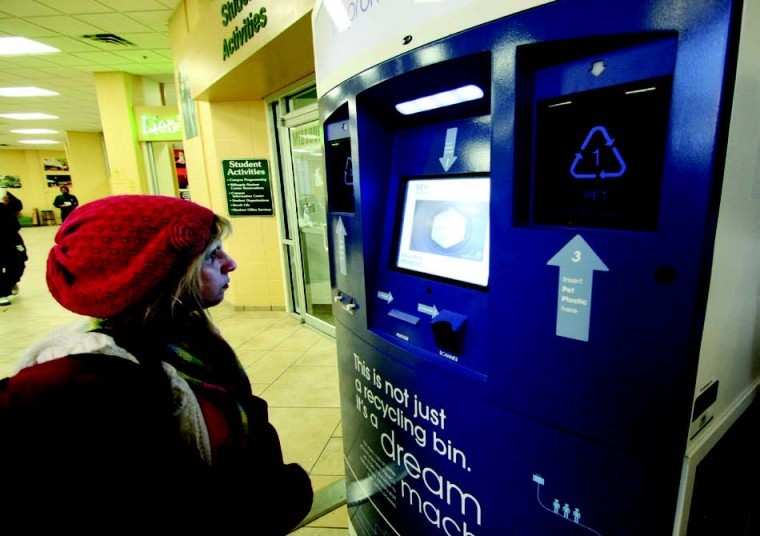Recycling options abound on campus
Marla Batten, sophomore nursing major, checks out the recycling kiosk located in the Lion’s Den last week.
In an effort to raise awareness and increase student involvement in recycling, Malorie Cashel, director of student activities, helped to bring The Pepsico Dream Machine to Missouri Southern in late Spring of 2011.
Located only in the Lion’s Den, this is a separate reward-based recycling tool that offers a personal incentive to those who participate.
Each time an individual recycles aluminum cans or plastic bottles, they earn points that can be redeemed for discounts at participating retail locations. Greenopolis sponsors the program.
Bob Harrington, director of the physical plant and risk manager for the University, began the recycling program at Southern when he came on campus 11 years ago.
This program from its inception has brought no cost to the University whatsoever.
Grants were obtained which provided all of the recycling bins and containers around campus and in the residence halls.
The custodial staff and grounds keepers collect the recyclables along with the mainstream trash and separate it for collection by Mid-west Fiber, of Carthage. The recycled materials include paper, plastic, aluminum and cardboard.
Harrington said that he has tried, unsuccessfully, each year to get a student organization to adopt recycling as their club project by taking charge of it, promoting it and putting up signs that will keep the program in front of the students.
He said the Student Ambassadors participated for about one and a half years but due to staffing and member changes, it got dropped. Signage and other reminders, along with additional recycle containers in a variety of locations, would go a long way toward helping the program be more successful.
“Anything we can do to make it a part of their daily lives will encourage students to recycle,” Cashel said.
In an informal survey, The Chart asked 50 students how they felt about recycling, several students who responded to the survey said they did not recycle because it was not convenient.
Although Custodial staff still find a lot of recyclable material in the regular trash, the program has been successful in that, while the program generates no income for the University, it has reduced the volume of mainstream waste that the University must pay to have hauled away.
“We have already reduced the number of weekly trash pick-ups,” Harrington said” If the students and faculty really got behind this program; we could reduce it that much more.” He added.
“The program is important because it’s the right thing to do for the economy, and it saves the University money because it costs us nothing to keep these materials out of the mainstream trash.”
Your donation will support the student journalists of Missouri Southern State University. Your contribution will allow us to purchase equipment and cover our annual website hosting costs.




























